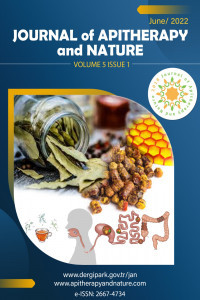Formulations Containing Propolis of Apis mellifera with Antibacterial and Antitumoral Activity
Formulations Containing Propolis of Apis mellifera with Antibacterial and Antitumoral Activity
A. mellifera, Propolis, HPLC,
___
- 1. BRASIL (2001). MINISTRY OF AGRICULTURE. Normative Instruction nº 3 - ANNEX VII - Technical regulation for determination of identity and quality of propolis. Diário Oficial da República Federativa do Brasil.
- Yayın Aralığı: Yılda 2 Sayı
- Başlangıç: 2018
- Yayıncı: Oktay YILDIZ
“Green” Synthesis of Gold and Silver Nanoparticles with Propolis Extract and Rosa damascena Waste
Anton M. SLAVOV, Daniela KARASHANOVA, Biliana GEORGIEVA, İvelina VASILEVA, Vassya BANKOVA, Rada DINKOVA, Nikoleta YANTCHEVA
Cytotoxic Activity of Four Propolis Colombian Samples Against Canine Osteosarcoma Cells
Dolly Patricia Pardo MORA, Oscar Julián MURILLO, Mauricio Rey BUITRAGO, Mónica LOSADA, Jaime Fabian Cruz URIBE, Karina Basso SANTIAGO, Bruno José CONTI, José Maurício SFORCIN
Mihaela NICULAE, Laura STAN, Adriana URCAN, Timea DOMOKOS, Daniel S. DEZMIREAN, Otilia BOBIS
The Biological Activities of Indonesian Propolis and It’ s Molecular Marker
Muhamad SAHLAN, Diah Kartika PRATAMI, Safira Candra ASIH, Andrea DEVINA, Alfiani Guntari MAHADEWI, Masafumi YOHDA, Siti FARIDA, Robiatul ADAWIYAH, Herbert SITUMORANG, Heri HERMANSYAH, Anondho WIJANARKO
New Insights into Tropical Propolis: Propolis from Pitcairn Island
Boryana TRUSHEVA, Kristina GEORGIEVA, Milena POPOVA, Veselina UZUNOVA, Tihomira STOYANOVA, Violeta VALCHEVA, Rumiana TZONEVA, Vassya BANKOVA
Determination of Phenolic Acids in Raw Propolis Using Near Infrared Spectroscopy
Ana María VIVAR-QUINTANA, İsabel REVILLA, María İnmaculada GONZÁLEZ-MARTÍN, Eddy Valentín BETANCES-SALCEDO
An Overview of Chemical Studies and Biological Activities of Mediterranean Propolis
Konstantia GRAIKOU, İoanna CHINOU
Phenolic Compounds of Spain Propolis
Félix ADANERO-JORGE, M Camino GARCÍA-FERNÁNDEZ, Rosa M VALENCIA-BARRERA, J. Javier SANZ-GÓMEZ
Portuguese Propolis: A Potenial Source of Environmentally Friendly Fungicides
Catarina PASSÃO, Claudia RODRIGUES, Cristina Almeida AGUIAR, Ana CUNHA
What We Know, and Don't Know, about the Benefits of Propolis to Honey Bee Health
